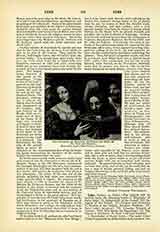

Lucius III, POPE, (UBALDO ALLUCINGOLI), b. at Lucca, unknown date; d. at Verona, November 25, 1185. Innocent II created him Cardinal–Priest of Santa Prassede on February 23, 1141, and afterwards sent him as legate to France. Under Eugene III he was sent as legate to Sicily and on January 1, 1159, he became Bishop of Ostia and Velletri. In 1177 he was commissioned by Alexander III to take part in the famous peace congress of Venice, where an amicable settlement was reached between Alexander III and Emperor Frederick I. Hereupon he was appointed a member of the court of arbitration which was instituted to investigate the validity of the donation of Countess Matilda, but which arrived at no definite conclusion. On September 1, 1181, a day after the-death of Alexander III, he was elected pope at Velletri where he was also crowned on the following Sunday, September 6. In the beginning of November he came to Borne, but there the revolutionary party soon became so incensed against him because he refused to grant them certain privileges which his predecessors had granted, that he was compelled to leave Rome in the middle of March, 1182. He went to Velletri where he received the ambassadors whom King William of Scotland had sent to obtain absolution from the ban which he had incurred under Alexander III. He freed the king from all ecclesiastical censures and as a sign of good will sent him the Golden Rose on March 17, 1183. From Velletri the pope proceeded to Segni where on September 5, 1183, he canonized Saint Bruno, who had been bishop of that place. He again returned to Rome endeavoring to put an end to the continual intestine dissensions of the Romans, but they made life so unbearable to him that he left the city a second time.
After spending a short time in Southern Italy Lucius III went to Bologna where he consecrated the cathedral on July 8, 1184. The remainder of his pontificate he spent at Verona, where, with the cooperation of Emperor Frederick I, he convened a synod from October to November, 1184, at which severe measures were taken against the prevalent heresies of those days, especially against the Cathari, the Waldenses, and the Arnoldists. At this synod the emperor promised to make preparations for a crusade to the Holy Land. Though the relations between Lucius III and Emperor Frederick I were not openly hostile, still they were always strained. When after the death of Bishop Arnold of Trier a double election ensued, the pope firmly refused to give his approbation to Volkmar, the candidate of the minority, although the Emperor had already invested him at Constance. Neither did Lucius III yield to the emperor who demanded that the German bishops, unlawfully appointed by the antipopes during the pontificate of Alexander III, should be reconsecrated and retain their sees. He also refused to grant Frederick’s request to crown his son Henry IV emperor. On the other hand, Frederick would not acknowledge the validity of the Matildan donations to the Holy See, and did not assist Lucius against the Roman barons. The letters and decrees of Lucius III are printed in P.L., CCI, 1071-1376.
MICHAEL OTT

